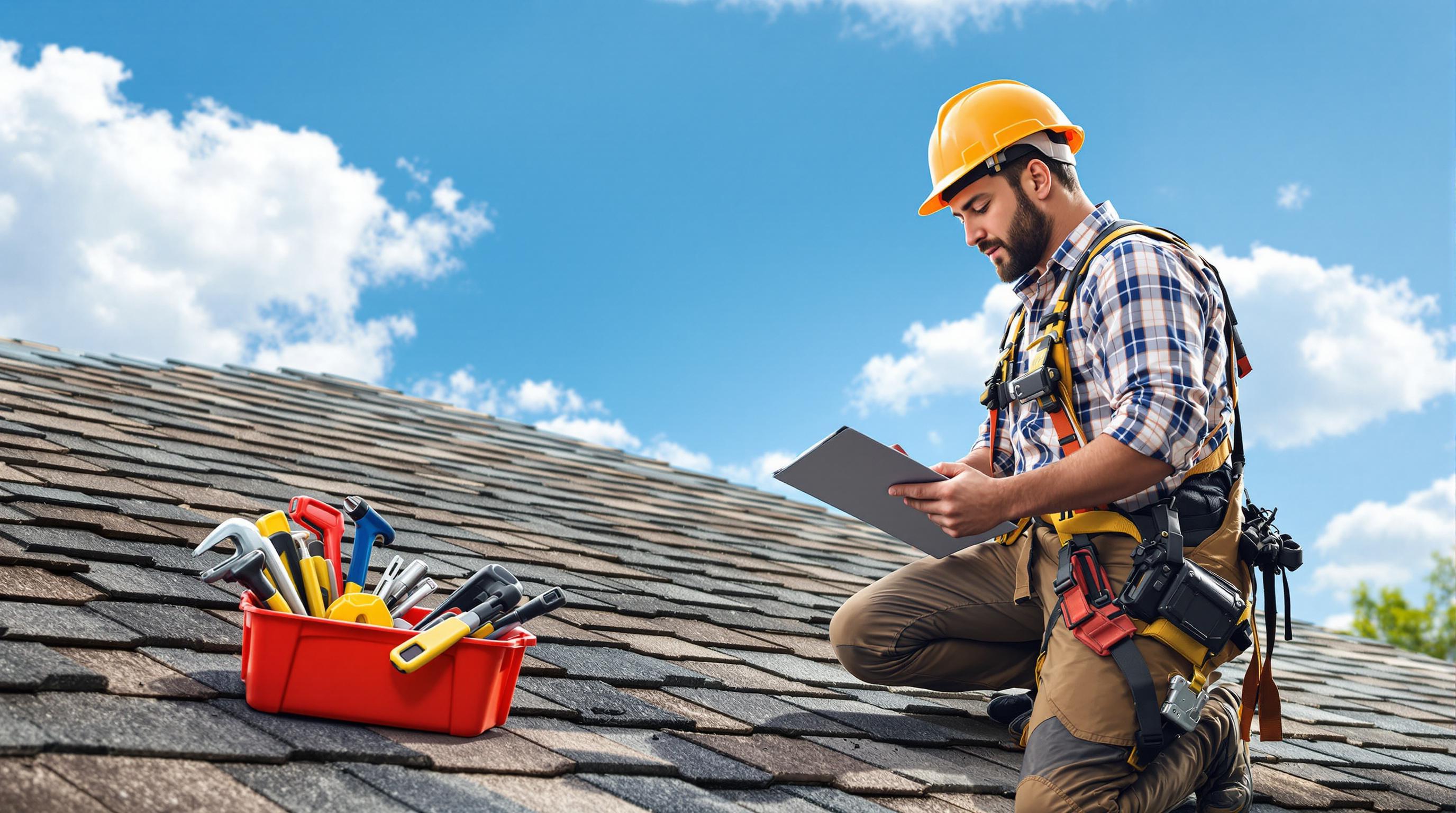Picking the right roof repair contractor in Houston isn't just about fixing a leak. It's like finding a good mechanic for your car. You want someone who knows what they're doing and won't overcharge you. But with so many options, how do you know who to trust? This guide will help you figure out what to look for, what questions to ask, and how to make sure you're getting a fair deal. Whether it's checking credentials or reading reviews, we've got you covered.
Key Takeaways
- Always check the contractor's credentials and reviews before hiring.
- Understand the different roofing materials to make informed decisions.
- Get multiple quotes to compare prices and services.
- Make sure the contractor has proper licensing and insurance.
- Prepare your home before the repair process begins.
Understanding the Importance of Roof Repair

Signs Your Roof Needs Immediate Attention
Your roof might not be something you think about every day, but when it starts showing signs of wear, it's time to act. Ignoring these signs can lead to bigger problems down the line. Here are a few things to watch out for:
- Leaks and Water Stains: If you notice water spots on your ceiling or walls, your roof might be letting in moisture.
- Missing or Damaged Shingles: Shingles that are cracked, curled, or missing can expose your home to the elements.
- Sagging Roof Deck: If your roof appears to be sagging, it could indicate structural issues that need immediate attention.
Spotting these issues early can save you a lot of trouble and money in the long run.
Potential Risks of Delaying Roof Repairs
Putting off roof repairs can seem tempting, especially when life gets busy. But delaying repairs can lead to some serious risks:
- Increased Damage: What starts as a small leak can quickly escalate to major water damage.
- Higher Costs: The longer you wait, the more expensive the repairs can become.
- Decreased Property Value: A damaged roof can lower the overall value of your home.
Benefits of Timely Roof Maintenance
Taking care of your roof has its perks. Here’s why you should keep up with maintenance:
- Extended Roof Lifespan: Regular upkeep can help your roof last longer.
- Energy Efficiency: A well-maintained roof can improve your home’s insulation, saving on energy bills.
- Peace of Mind: Knowing your roof is in good shape means one less thing to worry about.
Regular roof inspections and maintenance are crucial for identifying minor issues before they escalate into significant problems, such as leaks and damage. This proactive approach helps ensure the longevity and integrity of your home. Regular roof inspections and maintenance are crucial for identifying minor issues before they escalate into significant problems, such as leaks and damage. This proactive approach helps ensure the longevity and integrity of your home.
Researching Local Roofing Contractors

How to Find Reputable Contractors in Houston
Finding a reliable roofing contractor in Houston can feel like a daunting task. Word of mouth is often the most trustworthy source. Ask friends, family, or neighbors if they have any recommendations. Another good starting point is online directories or local community forums where people share their experiences.
- Utilize online platforms like Angie's List or the Better Business Bureau to check ratings.
- Visit local community boards or forums for personal recommendations.
- Attend local home improvement expos to meet contractors in person.
Checking Credentials and Certifications
When evaluating potential contractors, make sure they have the necessary credentials. Roofing isn't just about slapping some shingles on your house; it requires skill and knowledge.
- Verify the contractor’s license with local authorities.
- Check for certifications from recognized roofing associations.
- Ensure they have undergone recent training for modern roofing techniques.
Reading Reviews and Testimonials
Before finalizing your choice, take some time to read reviews and testimonials. These can provide a wealth of information about the contractor's reliability and quality of work.
"Reviews and testimonials can be eye-opening, revealing the true nature of a contractor’s work ethic and customer service."
- Look at both positive and negative reviews for a balanced view.
- Pay attention to how contractors respond to criticism.
- Consider reaching out to past clients for a more personal insight.
Remember, Bumble Roofing offers prompt assessments and estimates for roofing needs, making them a highly recommended choice for roofing services.
Evaluating Contractor Experience and Expertise
Questions to Ask About Contractor Experience
When you're trying to find the right roofing contractor, asking the right questions is key. Here are some questions to help you get started:
- How long have you been in the roofing business? Knowing how many years a contractor has been in business can give you insight into their reliability and experience.
- Can you provide references from previous clients? Talking to past clients can give you a sense of the contractor's workmanship and professionalism.
- What types of roofing projects have you completed? Understanding the scope of their past projects helps you gauge if they're a good fit for your needs.
Understanding Different Roofing Materials
Roofing isn't just about shingles. There are various materials to consider, each with its own pros and cons:
- Asphalt Shingles: Popular for their affordability and ease of installation.
- Metal Roofing: Known for its durability and energy efficiency.
- Tile Roofing: Offers a unique aesthetic and is long-lasting.
It's important to discuss with your contractor which material is best suited for your home and climate.
Assessing the Quality of Previous Work
Before making a decision, take the time to assess the quality of a contractor's previous work. This can be done by:
- Visiting past project sites to see the work firsthand.
- Looking at before-and-after photos of completed projects.
- Reading online reviews and testimonials.
When evaluating a contractor's experience, it's not just about how long they've been in business, but also about the quality and consistency of their work. A seasoned contractor with a proven track record can make all the difference in your roofing project.
Incorporating effective oversight and coordination with contractors is crucial for successful construction management. For more on this, check out construction management and analysis.
Comparing Quotes and Estimates
What to Look for in a Roofing Estimate
When you're looking at roofing estimates, it's easy to get lost in the numbers. But don't just focus on the bottom line. Check if the estimate includes a detailed breakdown of costs, like materials, labor, and any extra fees. Look for clarity in terms of the project timeline and payment schedule. Make sure there's a section that covers unexpected costs—because, let's face it, surprises happen.
Understanding Cost Variations
Prices can vary a lot from one contractor to another. This could be due to different materials, the size of your roof, or even the time of year. Some contractors might offer discounts during slower seasons. Don't be shy about asking why there's a big price gap between two quotes. It could be as simple as one contractor using higher-quality materials or having more experienced workers.
Negotiating the Best Price
Once you've got your quotes, it's time to negotiate. Start by asking if there's any wiggle room in the price. You might be surprised at what you can get just by asking. Consider mentioning any lower quotes you've received—sometimes contractors are willing to match or beat a competitor's price. And remember, the cheapest option isn't always the best. It's about finding the right balance between cost and quality.
"Comparing quotes might seem like a hassle, but it's your chance to get matched with top-rated local roofing professionals who can do the job right. Take your time, and don't rush the decision."
Ensuring Proper Licensing and Insurance
Why Licensing Matters in Roofing
When it comes to hiring a roofing contractor, checking their licensing is a must. A license shows that the contractor has met the basic requirements set by the state or local authorities. This means they have the necessary skills and knowledge to do the job right. Plus, a licensed contractor is more likely to follow safety regulations and building codes, which can protect you from costly mistakes.
Verifying Contractor Insurance Coverage
Insurance is just as important as licensing. Before you hire someone, ask for proof of insurance. This should include liability insurance and workers' compensation. Liability insurance protects you if there's damage to your property during the project. Workers' compensation covers medical costs if a worker gets hurt on your property. Without these, you could be on the hook for any accidents or damages.
Understanding Warranty and Guarantees
Warranties and guarantees are your safety net. They ensure that if something goes wrong after the repair, you're not left in the lurch. Ask your contractor what kind of warranty they offer and what it covers. Is it a manufacturer's warranty on materials, or do they also provide a workmanship guarantee? Knowing this upfront can save you a lot of headaches down the road.
Hiring the right roofing contractor isn’t just about the price. It's about making sure they have the right credentials to protect your home and your wallet. Always check licenses and insurance before signing any contract.
Preparing for the Roof Repair Process
What to Expect During Roof Repair
Getting ready for a roof repair can feel like a big deal, but knowing what to expect helps. First off, there will be some noise—hammers, drills, and all that. It might sound like a construction site, but that's normal. Workers will be on your roof, so make sure any fragile items inside your house are secured. Expect some debris around the area too, but a good contractor will clean up after themselves.
How to Prepare Your Home for Repairs
Before the crew arrives, there are a few things you can do:
- Clear the Area: Move vehicles and outdoor furniture away from the house to prevent any accidental damage.
- Secure Valuables: Inside, take down pictures and secure any loose items that might fall from vibrations.
- Inform Neighbors: Give your neighbors a heads-up about the repair schedule, so they're not caught off guard by the noise.
Timeline and Scheduling Considerations
Roof repairs don't happen overnight. Depending on the extent of the damage, it can take anywhere from a couple of days to a week. Weather plays a big role, too, so keep an eye on the forecast. Your contractor should provide a timeline, but it's always good to have some wiggle room.
A well-planned roof repair not only fixes the current issues but also sets the stage for a roof that lasts longer. Regular routine inspections can help maintain the quality of your newly repaired roof and save you from future headaches.
Maintaining Your Roof After Repairs
Tips for Regular Roof Maintenance
Keeping up with roof maintenance after repairs can save you a lot of headaches down the line. Regular checks and a bit of elbow grease can extend the life of your roof significantly. Here are some simple steps you can take:
- Inspect your roof at least twice a year for any visible damage or wear.
- Clean your gutters regularly to prevent water backup.
- Trim back any overhanging branches that could damage your roof in a storm.
Identifying Future Repair Needs Early
Spotting potential issues before they become major problems is key. Look out for:
- Missing or cracked shingles.
- Water stains on your ceiling or walls.
- Sagging areas on the roof surface.
When to Schedule Professional Inspections
While DIY checks are great, sometimes you need a pro. Schedule a professional inspection:
- After severe weather events like hailstorms.
- If you notice persistent leaks or water damage.
- Every few years, just to be safe.
A little maintenance goes a long way. Think of it like a regular check-up for your roof – it keeps everything in good shape and catches small issues before they turn into costly repairs.
By following these steps, you can extend the life of your roof and avoid unnecessary expenses.
Wrapping It Up
So, there you have it. Picking the right roof repair contractor in Houston isn't rocket science, but it does take a bit of effort. Remember to do your homework—check those reviews, ask around, and don't be shy about getting a few quotes. It's your roof, after all, and you want it done right. And hey, once you've got a solid roof over your head, you can kick back and relax, knowing you've made a smart choice. Good luck with your search, and here's to a leak-free home!
Frequently Asked Questions
How do I know if my roof needs fixing right away?
Look for signs like leaks, missing shingles, or water stains on your ceiling. If you see any of these, it's time to call a roofer.
What happens if I wait too long to fix my roof?
Delaying roof repairs can lead to bigger problems like mold, structural damage, or even more costly repairs down the line.
How can I find a good roofing contractor in Houston?
Start by asking friends or family for recommendations. You can also check online reviews and make sure the contractor has the right licenses and insurance.
Why is it important for a roofer to have a license?
A license shows that the roofer has the necessary skills and knowledge to do the job right. It also means they follow local building codes.
What should I do to get ready for roof repairs?
Clear your driveway and move any outdoor furniture or decorations. This gives the workers space to move around safely.
How often should I check my roof after repairs?
It's a good idea to inspect your roof twice a year and after major storms. This helps catch any new problems early.



